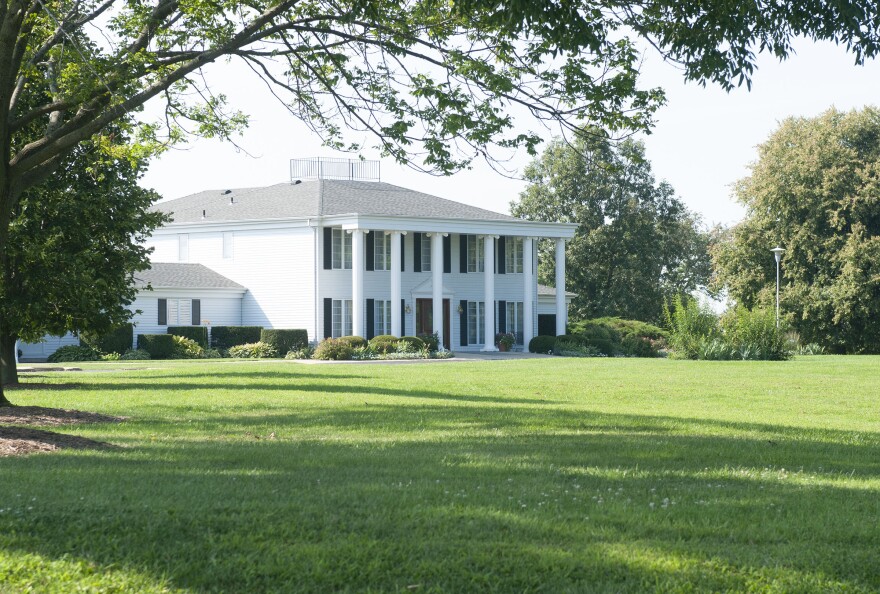About a mile away from Northern Illinois University’s campus in DeKalb, a nice 2-story house on the corner of Woodlawn Drive is vacant. The only sign of wear in sight is on a small metal sign in the freshly cut yard where the address is slowly rusting away.
Built in 1955, this house has been home to the presidents of NIU. But, when Dr. Lisa Freeman was hired last year, she already had a home in DeKalb.
NIU trustees began to ask themselves, "What do we do with this?" Because the house is “non-adjacent” to campus, if they wanted to sell it, the money would go back into the State’s general revenue fund.
That’s where State Representative Jeff Keicher came in. He introduced a bill to let NIU sell property off campus, and keep the money for a specific purpose.
“A lot of the details surrounding this bill actually go back to the budget impasse and the amount of deferred maintenance NIU had accumulated,” said Keicher.
Matt Streb is the chief of staff to the president at NIU.
“We have, by some measures, half a billion dollars of deferred maintenance,” said Streb. “Obviously, we're not going to cover the half billion dollars with the sale of that one house. But, nonetheless, that money can be put to improve classrooms on campus to help with roofs and a variety of other things that we desperately need.”
So the president’s house is going up for sale, along with several other properties owned by the school.
John Heckman is in charge of facilities and campus services at NIU. He said the school still has to spend money on the general upkeep of the house until it goes on the market this spring.
“While it is empty, we still have to mow the grass and keep everything in good condition,” he said. “We don't want it to deteriorate, and then you'll be ready to sell and we got a leaking roof or something.”
Another plan passed this year allows public universities and community colleges to sell off their surplus real estate and use the money for their deferred maintenance and emergency repairs.
In the future, will NIU be buying another presidential house?
“I think it's possible they could look for another potential property, maybe something closer to campus,” said Streb. “You know, a lot of institutions are moving more to kind of a housing allowance or a housing stipend.”
Lisa Freeman has no allowance, but the housing situations of university presidents across the state are very different.
Rep. Jeff Keicher says it's a conversation worth having.
“Is it needed? I mean, seriously, in this day and age, are you going to dictate to somebody where they should live just because they happen to be an executive at one of the state institutions?” he said. “I don’t think that’s appropriate.”
Eastern Illinois University doesn’t have a presidential residence. But their president does receive an annual housing allowance of more than $30,000, on top of a $290,000 salary.
For the Southern Illinois University system, neither of their chancellors nor the president currently have housing allowances in their contracts. They used to have a presidential house, called the “Stone Center,” which is now used as an office for the system president.

The University of Illinois system president lives in their 3-story, 14,000-square foot Georgian Revival-style home. The massive house has seen expensive repairs in the last two decades.
The chancellor for the University of Illinois at Springfield has a housing allowance of $25,000. The chancellor at University of Illinois at Urbana-Champaign, on the other hand, receives a $40,000 annual allowance. But the University of Illinois at Chicago’s chancellor forgoes his allowance to live in a university-owned home. In a previous administration, a Chicago Tribune report found the school spent a million dollars for renovations and maintenance while barely hosting events at the house.
Illinois State and Western Illinois both have a university residence.

At Western, their house is also empty. They just appointed an interim president. He was hired to be a provost, so he’d already bought a house in Macomb.
“Even though he and his family are not living at the home at this time, it is still being used for university events and functions,” said Darcie Shinberger, executive director of communication at WIU. “In fact, last week, Dr. Abraham did host a reception at the residence.”
University officials haven’t decided if the interim president will receive a housing allowance or if he’ll eventually move into the residence.
The legislation allowing the sale of the surplus property comes as Illinois also passed its first major infrastructure plan in a decade. The plan includes some money for billions of dollars in delayed maintenance for universities across the state.

